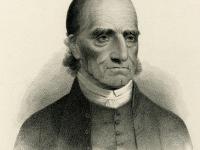Elias Hicks (1748-1830) was born in Long Island, New York, and worked as carpenter and farmer before becoming a Quaker minister around 1775. A few years later he set out as an itinerate preacher, which comprised most of his work during the 1800s, and visited congregations in Eastern states from Vermont to Maryland, including several in and around Philadelphia. He promoted the notion of the Inner Light (internal guiding principles) over the belief in the authority of the Bible. He believed in individual over group living and learning, and he opposed public education, slavery, and the construction of a railroad system in America.
The pervasiveness of Hicks' teachings among members of the Philadelphia Yearly Meeting, which took place at a meeting house constructed at Fourth and Arch streets, was only one issue in the congregational split that occurred around 1827. Other factors included economic status, political leanings, family ties, and location. After the schism, the local Orthodox Quakers continued to meet at the Arch Street Meeting House, while the Hicksite Friends constructed a meeting house of their own at Fifteenth and Race streets.
The Arch Street and Race Street meeting houses continue to serve members of the Society of Friends both locally and nationally. The Arch Street facility, which was constructed by Owen Biddle in the early 1800s, remains one of the oldest meeting houses still in use in Philadelphia.
HSP's library contains numerous resources on the Philadelphia Yearly Meeting and other Friends meetings, including general history books, reports from meetings, and extracts of meeting minutes. For manuscript materials concerning Elias Hicks and Quaker see the John Woolman papers (#737) and the Washington H. Penrose papers (#492).

